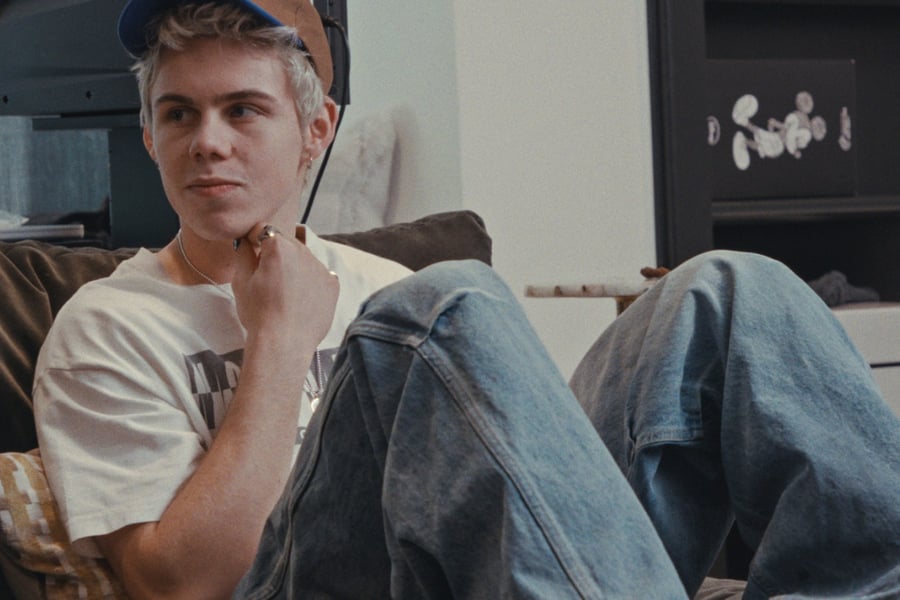If you purchase an independently reviewed product or service through a link on our website, Rolling Stone may receive an affiliate commission.
The Kid LAROI races against an invisible hourglass in his documentary Kids Are Growing Up: A Story About a Kid Named Laroi, now streaming on Prime Video. Directed by Michael D. Ratner, the feature follows the 20-year-old singer and rapper as he tours the world and begins to craft his debut album, The First Time. But between the time he spends away from his home in Sydney, Australia and the friends he’s lost to both death and distance, the musician has a lot of mental anguish to sift through.
Kids Are Growing Up finds Laroi beginning to make sense of bits and pieces of it all. “Money, fame, dreams coming true — that doesn’t resolve problems. It doesn’t stop them from happening. If anything, they just come on a bigger scale,” he explains in the film. “But I do tell myself every day, ‘Be grateful. Look at what you’ve got. Be Happy.’”
But that mantra becomes harder to repeat at his lowest moments. In one scene, Laroi details his battle with suicidal ideation, something he says he has experienced since childhood. “I definitely think the whole famous thing amplified it way more,” he admits. When the pressure became too much, he reached out for help. Having a therapist became an outlet for the musician, who also details repressed grief and trauma throughout the documentary.
In December 2019, a 16-year-old Laroi watched his close friend, mentor, and collaborator Juice WRLD die in front of him, just days after his 21st birthday. He explains in the film that he never opened up to anyone about the traumatic experience, not even a therapist, in the aftermath. “I have so many questions only he would be able to answer,” Laroi says. Another wave of grief came less than a year after Juice WRLD’s death when another close friend of Laroi’s was killed in a train surfing accident in early 2020.
But while dealing with more grief than any young adult should have to experience, the musician’s star was rising. In 2021, he scored the biggest hit of his career with “Stay.” The song, which featured a guest appearance from Justin Bieber, shifted Laroi into a higher pop tier, one with a wider audience and greater expectations. “Now I have to figure out what I’m doing next,” he says. “I gotta really apply the pressure, whereas before, you could kind of make music and put it out and just have it to your fans. I still can do that, I guess, but it’s just different now because now it’s this whole thing of, ‘He had this big song. What’s coming next?’”
In the midst of this, Laroi found a mentor within Bieber. “You’re gonna take over, bro,” the pop veteran tells him in one scene. “You’re gonna be better than I ever was.” Speaking about Bieber, Laroi recently told Rolling Stone: “He’s just a really special human being. He has no ego when it comes to supporting me. Not everyone’s like him. He’s very giving and he wants to offer everything that he has to help me.”
Love Music?
Get your daily dose of everything happening in Australian/New Zealand music and globally.
Throughout Kids Are Growing Up, Laroi develops a deeper appreciation for living in the moment, even when it comes with some melancholic growing pains. In another scene, during a visit to Australia, he instructs his driver to take a detour so he can visit his favorite Japanese restaurant. But when they arrive, he finds that its been closed permanently. He doesn’t know for how long, he hadn’t been there in a while.
“It makes me sad,” he admits, as flashes of footage from his childhood visits there with friends appear on the screen. Soon after, towards the end of the film, he reveals that his long-term relationship with girlfriend Katarina Deme had ended after three years. “I’ll say it like this,” he begins. “I love her. I’ll always love her. But I don’t think it’s best for us to be together.”
Laroi knows that nothing lasts forever and that he won’t always, if ever, be able to predict what’s coming next. Just before the credits roll, he declares: “I don’t want to be expected to make all the right moves. I don’t want to be expected to be a superhero. I’m just gonna be myself.”
From Rolling Stone US



































